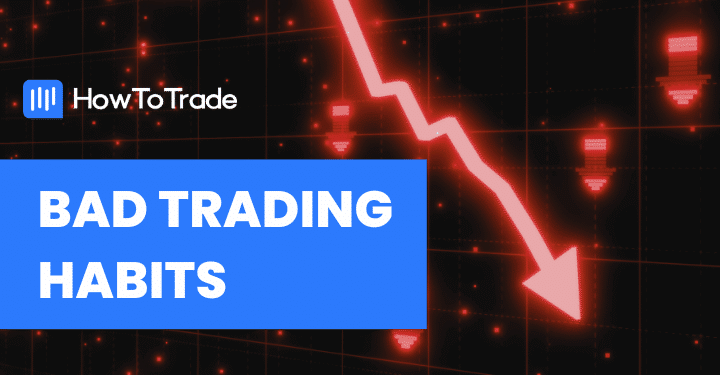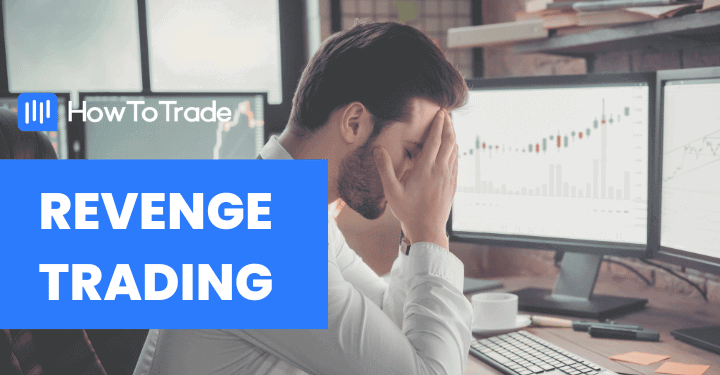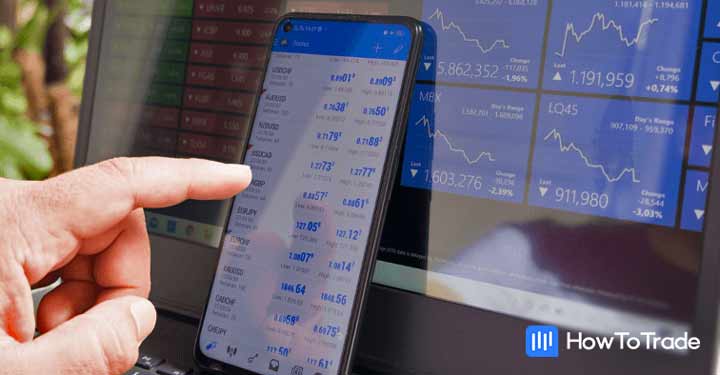
- Trading mistakes are an integral part of building a successful trading systems, and knowing the most common trading mistakes can help beginner and advanced traders to learn how to avoid these mistakes.
- Some of the most common trading mistakes include trading without a plan, lack of proper education, ignoring risk management or economic news, overtrading and revenge trading.
- By avoiding these common trading mistakes outlined in this article and adopting a prudent and systematic approach to trading, traders can increase your chances of long-term success in trading.
Trading financial markets offers exciting opportunities and potentially high returns. However, like anything in life, the path to success in trading is paved with both rewards and risks. Unwary beginner traders can fall victim to a number of common mistakes that can quickly erode their capital. By recognizing these pitfalls and adopting sound trading practices, you can increase your chances of navigating the forex market effectively.
In this piece, we’ll review some of the most common trading mistakes and help you find solutions to the toughest trading problems.
 The 6 Most Common Trading Mistakes You Must Avoid
The 6 Most Common Trading Mistakes You Must Avoid
6 Most Common Trading Mistakes You Need to Know About
Here are some of the most common mistakes forex traders make, along with steps you can take to avoid them:
1. Trading Without a Plan
Imagine venturing on a road trip without a map or destination. That’s essentially what trading without a plan is like in the fast-paced forex market. You’ll get somewhere, but you’ll never get anywhere because you have no destination.
Why is Trading Without a Plan a Mistake?
Here’s why winging it in the forex market is a bad idea:
- Lack of Direction: Without a trading plan, you lack a clear direction in your trading activities. A plan outlines your goals, risk tolerance, and the trading strategies you intend to use. Trading without this roadmap can lead to impulsive decisions based on emotions rather than a well-thought-out strategy.
- Inconsistent Decision Making: Trading without a plan often results in inconsistent decision-making. Emotions like fear and greed can take over, causing you to deviate from rational choices. A plan provides a structured framework, helping you stick to predefined rules, avoid emotional decision-making, and ultimately get the final goal of developing consistency in trading.
- Undefined Goals: A trading plan establishes clear goals and objectives, such as profit targets and performance benchmarks. Without these goals, you may lack motivation and may not have a realistic expectation of what you aim to achieve, leading to frustration and disappointment.
- Failure to Learn from Mistakes: A trading plan often includes a review process that allows you to evaluate your performance and learn from mistakes. Without a plan, you’ll likely repeat errors without a structured approach to self-improvement.
How to Avoid Trading Without a Plan
To avoid this mistake, develop a trading plan that acts as your roadmap to success. This plan should clearly outline your entry and exit strategies for each trade.
If you’re a technical indicator trader, for instance, ask yourself these:
- What technical indicators will signal a buying or selling opportunity for me?
- At what point will I exit the trade to lock in profits or minimize losses?
- What other risk management parameters should I employ? Should I use trailing stops? Should I take partials?
- How many consecutive trades do I get to lose before calling it a day?
Most importantly, you must define your maximum acceptable loss per trade, typically a small percentage of your total capital (1-2%). This is known as the risk-reward ratio and is certainly a key aspect of developing a successful trading plan. Finally, set money management rules. Determine how much capital you’ll allocate to each trade, ensuring you don’t overexpose yourself to risk. Backtest your trading plan on historical data to assess its effectiveness before risking real capital. This process allows you to refine your strategy and identify any weaknesses before putting your money on the line.
HowToTrade has a great trading plan template to help you keep track of these things. In addition, you can also download our Trading Journal Template to record all your trades. Finally, your trading plan doesn’t just start when you’re about to make your trade. It begins with how you start your trading day and creates a good trading routine.
2. Lack of Proper Education
Lack of proper education is what makes people approach trading as if it were gambling. But you see, the market is a complex and dynamic beast. Understanding how it works, the factors that influence asset values, and the various trading strategies isn’t something you can guess based on “feeling.” It requires proper education.
Why is a Lack of Proper Education a Mistake?
Here’s why trading without proper education is a mistake to avoid:
- Limited Understanding of the Market: Trading involves a complex set of factors, including economic indicators, geopolitical events, and market psychology. Without proper education, you’ll not understand how these factors interact and influence currency prices, leading to uninformed decisions.
- Inadequate Technical Analysis Skills: Technical analysis is vital in trading. It involves studying price charts, chart patterns, and various indicators to predict future price movements. Without adequate technical analysis, you’ll struggle to interpret charts, identify trends, and use technical indicators effectively, hindering your ability to make informed trading decisions.
- Unrealistic Expectations: You’ve seen those young traders with expensive houses and cars, haven’t you? So, you think you’re going to live that kind of life within a month or two of trading, don’t you?
That, right there, is an unrealistic expectation that comes from a lack of education. Lack of proper education contributes to unrealistic expectations about the potential profits and risks associated with trading. And traders who enter the market without a clear understanding of its dynamics may be prone to chasing unrealistic gains or getting discouraged by normal market fluctuations.
- Failure to Use the Right Trading Tools: Many trading platforms offer a variety of tools and features that can assist traders in making informed decisions. Without proper education, you’re likely to be unaware of or not know how to use these tools effectively, missing out on valuable resources that could enhance your trading strategies.
How to Tackle the Lack of Education?
Take the time to educate yourself thoroughly before risking your capital. Utilize various educational resources, including online courses, trading seminars, reputable trading books, and informative websites. HowToTrade, for instance, is a great online destination for a holistic pathway of learning how to trade forex from being a complete newbie to a profitable professional. To get this edge, we recommend visiting our cheat sheets library, and our trading tools.
Additionally, consider practicing with a demo account to gain hands-on experience without risking real money. A comprehensive understanding of forex trading principles will help you make informed decisions and confidently navigate the market.
3. Ignoring Risk Management
Not managing your risk is the fastest way to go broke trading financial assets. Even the best trades have lost a lot of capital from improper risk management. Completely ignoring risk management? That’s a different kind of beast!
Why is Ignoring Risk Management a Mistake?
Here’s why ignoring risk management is a sure way to burn your trading account:
- Undefined Stop-Loss and Take-Profit Levels: Setting appropriate stop-loss levels is crucial to risk management. Setting profits on a winning trade is also important. Traders who ignore this aspect may fail to define clear exit points for their profitable trades, exposing them to unlimited risk. A well-thought-out risk management plan includes predetermined stop-loss and take-profit levels based on technical analysis, volatility, and overall market conditions.
- Slow Recovery: Large losses take time to recover from, both financially and mentally. If you ignore risk management, you expose yourself to this. Proper risk management helps you stay in the game by minimizing losses.
- Excessive Leverage: One of the common pitfalls associated with ignoring risk management is the misuse of leverage. Leveraged trading allows traders to control larger positions with a smaller amount of capital, but it also magnifies the impact of price movements. Traders who neglect risk management may use excessive leverage, leading to larger-than-expected losses and increased vulnerability to market fluctuations.
- Failure to Diversify: Lack of risk management often leads to a failure to diversify trading positions. Relying too heavily on a single currency pair or trading strategy can expose traders to concentrated risk. Diversification helps spread risk across different assets, reducing the impact of adverse price movements in any one position.
- No Risk-Reward Ratio Consideration: A crucial aspect of risk management is considering the risk-reward ratio for each trade. Traders who ignore this may enter positions without assessing the potential reward in relation to the risk undertaken. A positive risk-reward ratio ensures that potential profits outweigh potential losses, helping you achieve a more favorable overall outcome.
- Emotional Decision-Making: Ignoring risk management often leads to emotional decision-making during trades. Traders may panic during adverse price movements, abandon their risk management plan, and make impulsive decisions. This emotional response can amplify losses and undermine the overall trading strategy.
How to Avoid the Mistake of Ignoring Risk Management
There’s no one-size-fits-all approach to risk management. The ideal strategy depends on your individual risk tolerance, trading style, and account size. But here are some tips for avoiding the mistake:
- Define Your Risk Tolerance: How much trading capital are you comfortable losing on a single trade?
- Set Stop-Loss Levels: Place stop-loss orders at a distance from your entry point that reflects your risk tolerance.
- Manage Position Size: Start with smaller positions until you gain experience and confidence, then increase your position size gradually.
- Diversify Your Portfolio: Don’t put all your eggs in one basket. Spread your trades across different currency pairs.
By incorporating risk management techniques into your trading plan, you’ll be well on your way to becoming a more disciplined and successful forex trader. Remember, trading is a marathon, not a sprint. By prioritizing risk management, you’ll protect your capital and increase your chances of long-term success.
4. Overtrading
The allure of quick profits and the fast-paced nature of the financial market can tempt you to trade excessively, which is a common trading mistake new traders often make. You would think the more trades you take, the more money you make. But this isn’t always true. Most experienced traders pick their trading days. And they don’t just jump into any trade.
Why is Overtading a Mistake?
Next to ignoring risk management, overtrading is the quickest way to burn your trading account, and here’s why:
- Increased Transaction Costs: Overtrading often leads to a higher number of transactions. Each trade typically incurs transaction costs, such as spreads or commissions. The cumulative effect of these costs can significantly reduce overall profits, especially when trades are taken impulsively or without a solid strategy.
- Lower Quality Trades: The more trades you execute, the more likely you are to take lower-quality setups. Overtrading leads to impulsive entries and exits without proper analysis, reducing the probability of success. You’re also spread too thin when you try to manage too many positions at once. When trading stocks and other financial instruments, quality over quantity is a principle in trading, and overtrading often sacrifices the former for the latter.
- Exhaustion and Burnout: Constantly monitoring the market and executing a large number of trades can exhaust you. Trading requires focus, discipline, and a clear mindset. Overtrading may compromise these qualities, leading to fatigue, stress, and an increased likelihood of making mistakes.
- Deviation from Trading Plan: Overtrading is often a result of deviating from a well-defined trading plan. It’ll cause you to take positions that do not align with your strategies or enter the market without waiting for high-probability setups. This lack of discipline can erode the effectiveness of your trading plan and increase your risk of losses.
- Reduced Profitability: While some traders may believe that more trades lead to more profits, overtrading can have the opposite effect. Excessive trading may dilute the impact of successful trades, especially if the increased number of trades includes a significant proportion of losing positions. Quality trades based on a sound strategy are more likely to contribute to sustained profitability.
How to Deal With Overtrading
Here’s how to tame the overtrading beast that forces you to trade:
- Develop a Trading Plan: Define your entry and exit criteria and risk management strategies and stick to them.
- Focus on Quality over Quantity: Wait for high-probability trades based on your strategy instead of chasing every opportunity.
- Practice Patience: Discipline is key. Don’t feel pressured to trade all the time.
- Journal your Trades: Track your trades and analyze your performance using a trading journal to identify overtrading tendencies. The HowToTrade trading journal template is suitable for this purpose.
By avoiding overtrading and focusing on well-planned, high-quality trades, you’ll be on the path to becoming a more consistent and successful forex trader.
5. Revenge Trading
So, you’ve lost a trade, and you’re angry with yourself or the market. You vow to make sure your next trade is a win, but you’re not doing anything differently. That’s a common trading mistake you’re about to make. It’s called the mistake of revenge trading.
Why is Revenge Trading a Mistake?
Here’s why revenge trading is a mistake:
- Emotional Decision-Making
Revenge trading is driven by intense emotions such as frustration, anger, or disappointment from previous losses. These emotions can cloud your judgment, leading to impulsive and irrational decision-making. Emotional decisions often contradict a well-thought-out trading strategy and can result in further losses.
- Increased Risk Exposure
Revenge trading increases your risk exposure by taking larger positions or using higher leverage in an attempt to recover losses quickly. This heightened risk can lead to substantial financial losses as traders deviate from their risk management plans.
- Deviation from your Trading Plan
Revenge trading typically involves a deviation from the trader’s established trading plan. Instead of following a systematic approach based on analysis and strategy, you succumb to emotions and take trades impulsively. This deviation undermines the discipline and consistency necessary for successful trading.
- Chasing Losses
Revenge trading is a form of chasing losses, where you aim to recover previous losses with impulsive and often poorly considered trades. Chasing losses can create a destructive cycle, causing you to take increasingly aggressive positions in an attempt to recoup losses, leading to a deeper drawdown.
- Negative Impact on Confidence
Experiencing losses and engaging in revenge trading can have a long-lasting impact on your confidence and erode your self-esteem, making it challenging to approach future trades with a clear and positive mindset.
- Strained Risk Management
Revenge trading often involves neglecting sound risk management principles. Traders may fail to set appropriate stop-loss levels, determine position sizes based on their risk tolerance, or consider the overall risk-reward ratio. This lack of risk management can keep you in a losing trade longer than necessary, exacerbate losses, and increase the likelihood of a significant account drawdown.
- Cycle of Emotional Trading
Engaging in revenge trading can create a cycle of emotional decision-making. Each impulsive trade driven by the desire to recover losses can lead to additional emotional reactions, further impacting decision-making and perpetuating the negative cycle. Ultimately, it can be the main trigger that leads to bad trading habits.
- Diminished Objectivity
Emotional turmoil resulting from revenge trading can impair your ability to maintain objectivity and make rational assessments of market conditions. This diminished objectivity can lead to poor decisions and further losses.
How to Avoid Revenge Trading
Every trader feels the urge to revenge trade. But here’s how to not give in:
- Accept Losses as Part of the Game: Losses are inevitable in forex trading. Focus on learning from them and improving your strategy.
- Step Away After a Loss: Give yourself time to cool down and clear your head before re-entering the market.
- Focus on Your Trading Plan: Stick to your predefined entry/exit points and risk management strategies, even after a loss.
- Practice Emotional Control: Develop techniques to manage emotions and avoid trading decisions fueled by anger or frustration.
You can avoid the emotional trap of revenge trading by staying calm and disciplined. Remember, consistent, well-planned trades are the key to long-term success in forex, not impulsive attempts to win back losses.
6. Ignoring Economic News
The forex market is susceptible to economic news events and data releases. Major economic indicators, such as interest rates, inflation data, and employment figures, can significantly impact currency valuations.
Why is Ignoring the News a Mistake?
Here’s why ignoring the news may cost you:
- Unexpected Market Reactions
When you ignore the news, you see sudden spikes and wide movements that disrupt your technical analysis. And if you were in a trade, you are like cut out. This is what ignoring the news does to you.
- Inadequate Knowledge about Market Direction:
The news gives you an overview of the market’s direction. Without this overarching information, you’re likely to trade against the major direction of the market, especially if you’re a day trader.
- Loss of Opportunities
Economic data also offer trading opportunities. So, ignoring them could cause you to lose opportunities you didn’t even know existed.
How to Keep Track of The News
- Track Key Economic Indicators: Identify the major economic news releases for the currencies you trade and factor them into your trading plan. It’s advisable to closely monitor the economic calendar to know what economic data is about to be released.
- Analyze the News and Impact: Don’t just react to headlines. Analyze the data and its potential impact on the respective currency based on your understanding of supply and demand and central bank policy.
- Use the News to Confirm Existing Strategies: Economic news can be used to confirm or refine existing trading strategies based on technical analysis. Don’t rely solely on news for entry and exit points.
And that’s how you trade the news. You’ll be well-equipped to make informed trading decisions and navigate the forex market more effectively by staying informed about economic news and its potential impact on currencies.
Over To You
In sum, trading can be a lucrative endeavor for those who approach it with diligence, discipline, and a commitment to continuous learning. By avoiding the common pitfalls outlined in this article and adopting a prudent and systematic approach to trading, you can increase your chances of long-term success in the dynamic world of financial markets. Everybody makes mistakes, but those who learn how to avoid their mistakes can get the necessary edge to succeed in life as well as in trading.
Risk Disclosure: The information provided in this article is not intended to give financial advice, recommend investments, guarantee profits, or shield you from losses. Our content is only for informational purposes and to help you understand the risks and complexity of these markets by providing objective analysis. Before trading, carefully consider your experience, financial goals, and risk tolerance. Trading involves significant potential for financial loss and isn't suitable for everyone.






